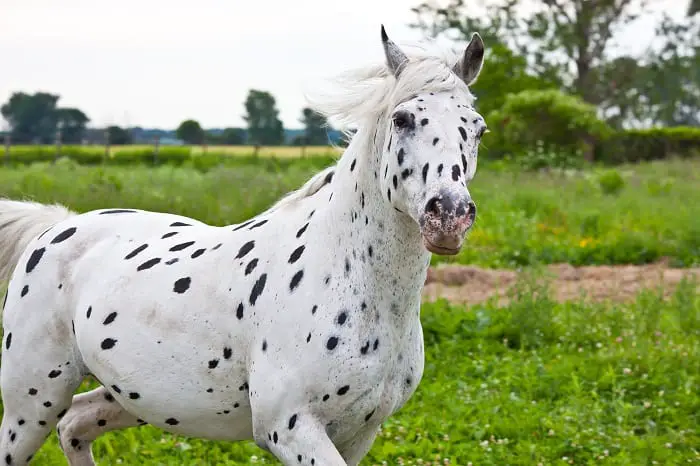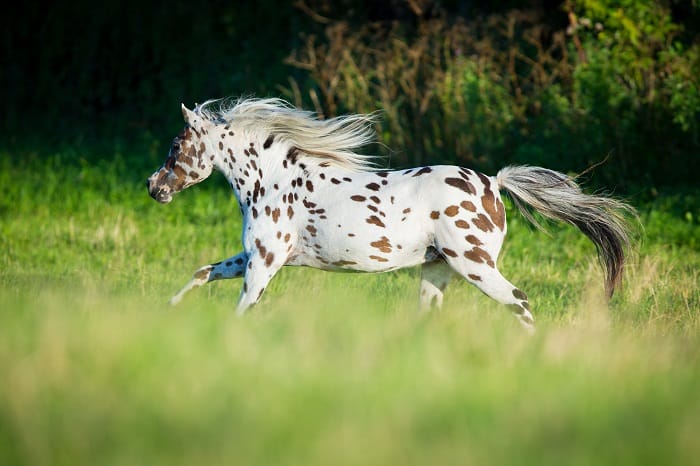Last Updated on April 2, 2023
The Appaloosa temperament, size, and weight make this beautiful spotted horse breed a versatile choice for many equestrian pursuits. If you are considering buying an Appaloosa horse, you’ll first want to make sure that this breed is the right one for your needs. Let’s find out everything you need to know about these eye-catching horses!
Appaloosa Temperament
Noticing a horse with some unusual spots? Maybe you’re just seeing an Appaloosa horse for the first time! The Appaloosa is a breed of horse native to North America, originally used as a mount by Native Americans. Today, the Appaloosa is known for being a diverse and intelligent breed of horse, used for trail riding, western pleasure, jumping, and more.
The temperament of the Appaloosa is based on their high intelligence levels. Appaloosas are extremely smart and they have big personalities.! They are smart enough to know when they can or cannot trust a human, and this means anyone handling an Appaloosa needs to take care to create a trusting bond with their horse.
Appaloosas are clever enough to figure out when they are being mistreated, and they know when they are being treated well. If they can trust the people that surround them, Appaloosas aim to please and have a strong working partnership with their riders.
Appaloosa horses have a reputation for being hardworking and loyal to the people they love. They have fantastic work ethics and always enjoy their jobs. They can be great children’s horses, and they do their best to look out for the people they care about.
Learn more fun facts about the history of Appaloosas here:
How to keep your Appaloosa calm & happy
Appaloosas, like many horse breeds, thrive on a regular schedule of exercise and turnout. This breed is athletic and has a lot of energy; they like to be outside for long periods, and they love having job to do. Remember that this breed was bred for its docile and quiet temperament, but, like all horses, they can become restless if not given the right opportunities to exercise and play.
The key to keeping a horse calm and happy is to allow them the chance to express normal and natural behavior patterns as much as possible. This means ensuring the horse gets time each day to graze, explore, play, roll, socialize, and rest. Most horses that live in stalls should receive turnout in a pasture or pen for at least four or five hours a day, if not more. Some horses live outside year-round, and these horses tend to have fewer behavioral problems than stall-kept horses.
Most Appaloosa owners find that their horses thrive on a regular schedule, but they must get time out in the paddock to maintain their physical and emotional well-being.
Appaloosas also enjoy having a job to do – these horses used to live in camps with tribes of Native Americans, and they were part of the family! An Appaloosa that does not receive sufficient mental stimulation will quickly become bored and sour.
However, these horses are not hot-headed, and will not become unruly if they are not exercised every day. As long as your Appaloosa gets to have fun with you a few times a week, it will always remain in good spirits.
If Appaloosas do not have adequate turnout time or exercise, they can become irritable, or “sour.” Appaloosas need something to focus their attention and energy on. With ample daily turnout time and training a few times a week, this is not difficult to provide.
When given proper attention, Appaloosas can excel in nearly all disciplines. While preferred by western riders for cutting, pleasure, reining, and roping, Appaloosas can also excel in English disciplines such as eventing, dressage, and jumping.
How to Train an Appaloosa Horse
Training methods will be different for every horse, but there are certain things that Appaloosa enthusiasts recommend keeping in mind when training these spotted beauties. Firstly, remember that Appaloosas are smart, and this will show when they are being trained. They will sometimes do quirky, though rarely dangerous things to test their riders. Oftentimes, the only way to gain their respect in these circumstances is to outsmart them.
The staple of any horse’s training is groundwork, and Appaloosas are no exception. Appaloosas are big on trust and respect, and this starts from the ground, not the saddle. Lunging, in-hand, and liberty work are all ways to establish respect and trust on the ground. Working on these areas is crucial in establishing a relationship with an Appaloosa before getting in the saddle. It is also important to revisit groundwork periodically, particularly if a communication issue occurs in the saddle.
Once you have established a positive, respectful relationship with your Appaloosa, it will be easy to train them to excel in whichever discipline you wish. Not only do they have good work ethics and learn extremely quickly, but Appaloosas are also versatile and can be taught a lot of different skills. If you use a watchful eye and gentle technique, an Appaloosa will fit any mold you build for it.
Is Coloring Linked to Personality with Appaloosas?
While some believe that there is a connection between an Appaloosa’s color and its personality, perhaps due to some examples of potential correlation, no connection has been scientifically proven. Of course, if one trainer has better luck with bay-blanketed Appaloosas being good for kids, this trainer will probably think it has to do with that color. On the other hand, if another trainer has an ill-luck with dun leopard Appaloosas, such a trainer will likely think that it’s a character trait of that specific color.
And while some individuals may swear by this, nothing has been proven so far. It is merely speculation, the same way connecting hair color with personality traits in people is purely speculative. Some riders and trainers will favor certain coat colors for certain events, but no true correlation can be proven.
Appaloosa Horse Height
So, you’ve decided that the Appaloosa temperament makes this the right horse for you, but what about the size? Is this mount going to be the right size for the equestrian pursuits you have in mind?
In comparison to many other riding horse breeds, the Appaloosa is slightly smaller than average. Their height ranges from 14.2 – 16 hh, so they will be a reasonable size for most smaller adults and teenagers. Smaller Appaloosas are also good mounts for children, making them a good choice for a family pony.
However, if you are a taller, larger adult, you may struggle to find an Appaloosa that is large enough to carry you. While these horses are very strong and can carry considerable weight, a taller rider may struggle to remain balanced on a smaller mount such as the Appaloosa.
Appaloosa Horse Weight
Appaloosa horses have stocky, muscular physiques and weigh more than average for a riding horse of their size. Their average weight ranges from 1,000 to 1,100 pounds, which is comparable to the weight of larger Thoroughbred and warmblood horses.
When it comes to calculating the weight a horse can carry, it is estimated that a fit horse can carry around 20% of its body weight. So, a 14.2hh Appaloosa weighing 1000 pounds could, in theory, carry weights of up to 200 pounds. However, it is important to factor in the weight of the saddle here, as some saddles, particularly western-style ones, can weigh a considerable amount.
Appaloosa Price
So, if you’ve got your heart set on an Appaloosa horse, but how much should you expect to pay for one? Firstly, remember that you are buying a purebred horse with a strong pedigree, so the price is going to be considerably more than an unregistered crossbred horse. By going to a reputable breeder such as Palisades Appaloosas, you can guarantee that your horse has been bred with its health, temperament, and physical well-being as a top priority.
For a fully-trained adult Appaloosa, expect to pay a price of $5,000 or more. Younger untrained Appaloosas may be cheaper than this, but you will need to put the time and effort into training it yourself. The price for Appaloosas with certain highly desirable spotted markings can be very high, particularly if they are good breeding stock.
Conclusion
The Appaloosa temperament is important to consider in training, activity, and all aspects of horse ownership. They are very athletic and intelligent horses, and their care must reflect that to form a successful partnership.
Also, Appaloosas are versatile and if respected and cared for, can do nearly anything you ask of them. I hope this article helped you understand Appaloosa in its entirety and gave you an interest in this beautiful breed! Please ask questions and share your Appaloosa stories with us!
Frequently Asked Questions
Michael Dehaan is a passionate horse owner, horse rider, and lover of all things equine. He has been around horses since he was a child, and has grown to become an expert in the field. He has owned and ridden a variety of horses of different breeds, and has trained many to compete in shows and competitions. He is an experienced horseman, having worked with and competed many horses, including his own. He is an active member of the equestrian community, participating in events and teaching riding lessons.


